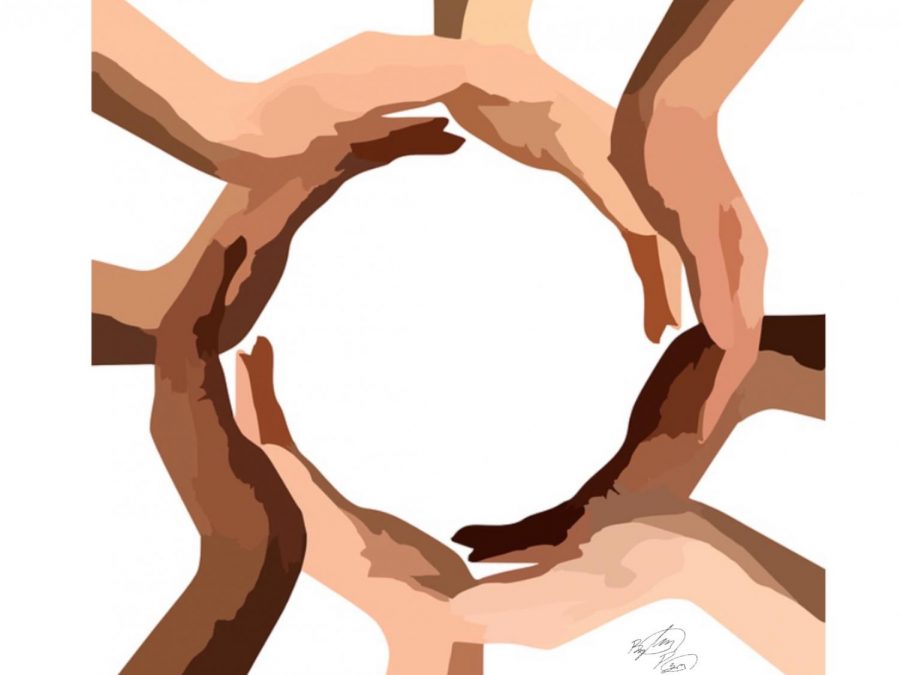Colorblind in a Colorful World
We have always been told to not to see color. That color shouldn’t matter if it is perceived that everyone is treated equally. That color is just something we are born with and not something that defines us.
Ben Pizon’s artistic interpretation of race in the modern world.
From a young age, we have been taught to not see color; that pretending to notice differences in ethnicity will ensure equality. We have been taught to be colorblind.
But don’t all of our characteristics collectively define us? In order to fully appreciate each other, shouldn’t we at least consider the beauty of our differences? Or is asking a question about an ethnicity different from our own just too risky?
In a society that prioritises political correctness, “political incorrectness” is equivalent to social suicide. Is ignoring one another’s culture to avoid the possibility of a political mishap the simple solution?
When is it politically correct to use a term of color when describing a person? The Census Bureau allows a person to identify as White, Black or African American, Asian, American Indian, or Pacific Islander.
If this political body correctly uses “white” as a term to describe race, it follows that “white” is a politically correct term. But what about the category “Black or African American”? If the Consensus Bureau isn’t willing to make the call, how can I?
If the powers of political correctness give the option to identify as “Black or African American”, how does this direct our politically correct language?
We refer to people from European descent as “white”, so why shouldn’t we refer to people from African descent as “Black”?
Ever since I was a kid, I’ve always been scared to use the term “Black” when referring to people of African descent.
In our efforts to ensure a politically correct environment at NAI, we asked Cecil Nelson, a Black student at NAI, the following question-
“Do you think using the word black when describing somebody of African descent in the United States is rude or offensive or do you just look at it like part of your identity?”
Nelson responded, “When talking about people from African descent most people in the US use African American and Black interchangeably. Some use African American to not seem “racist” when talking about people of African descent.”
Society is very careful with the way they bring up anything they feel could be slightly offensive, giving rise to the colorblind nature of many people. People avoid seeing color to prevent the chance of being labeled as racist.
Nelson also added, “Others use Black because it is typically quicker and fits better in conversation. I think people should use the words separately because I think they describe two different types of people. I think African American describes people who have descended from slavery and should not be used to describe everyone who comes in from Africa.”
A lot of people don’t understand this crucial difference between these two terms. The term “African American” does not accurately represent every black person living in the United States. Though it might be said out of respect, it is exclusive to some Black people.
“Instead, people should use the term Black because it’s more inclusive, can be used to describe a variety of cultures, and leaves room for people to talk about their heritage instead of it being people assumed that they descended from slaves.”
“Black” is a much broader term and takes into account all cultures surrounding those who originated from Africa, rather than just referring to a certain group of people. Black is a broad term that serves as a metaphor for the inclusive manner in which we should embrace culture in our society.
We should not be fearful of offending someone by asking questions about their culture but rather have insightful discussions about it to further our knowledge and perspective of the world.
Furthermore, in a time when seemingly everyone is preaching kindness, many people remain colorblind in an effort to avoid stigmatizing any certain race. However, when we do this, we minimize cultures, identities, languages, and many things that make people’s identities unique.
Think about watching a black and white movie. Don’t you find them so much more boring than colorized movies? Color gives life so much more meaning and without it, we could lose so much of what makes life beautiful and ignoring culture is the same.

Abbey Hahn is a sophomore at North Allegheny Intermediate School and a first-year Staff Writer for the NAEye Newspaper. She enjoys being involved in a...

Pratik Yarlagaddda is a sophomore at NAI. This is his first year as NAEye's lead interviewer. He participates in the North Allegheny Marching Band and...
Benjamin Pizon is a sophomore at North Allegheny Intermediate High School. This is his first year being apart of the NAEye, creating artwork for articles....


